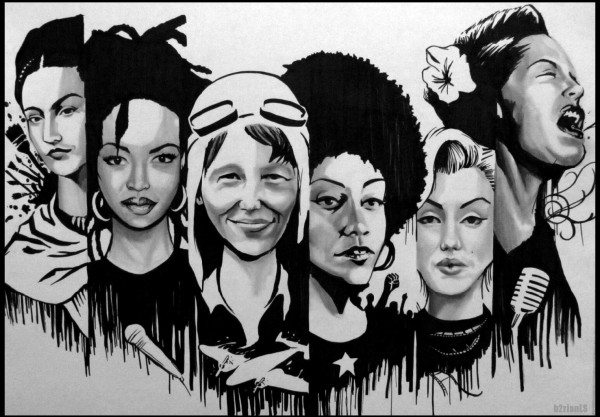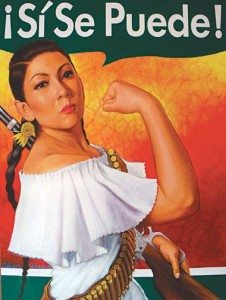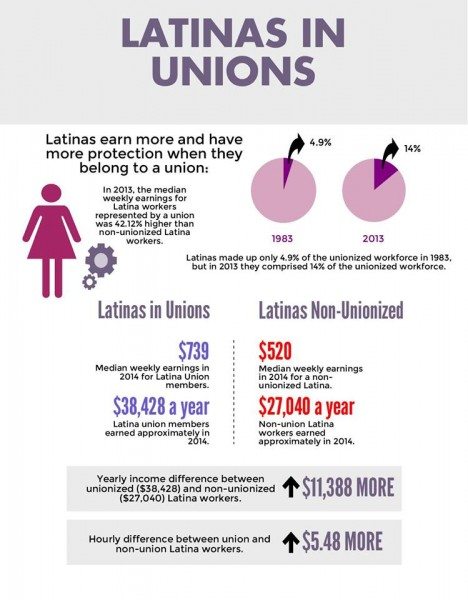

Women History Month: East Flatbush Library, Brooklyn
This may come out of left field, but I’m pro-union; pro-trabajadoras. You may read my CEO title and think I’m part of the problem. The truth is, I’m a trabajadora too. In fact, my career in this industry took a steady, stable pace in 2008 when I joined the workforce at the Screen Actors Guild, now SAG-AFTRA. This union represents approximately 160,000 actors, announcers, broadcast journalists, dancers, DJs, news writers, news editors, program hosts, puppeteers, recording artists, singers, stunt performers, voiceover artists and other media professionals. Many of them, as you may already know, are hard working Latina women.


The 2014 study The Women’s Leadership Gap published by our friends of The Center For American Progress reveals that:
52% of all professional-level jobs are held by women, and yet only 14.6% are executive officers, 8.1% are top earners, and 4.6% are Fortune 500 CEOs. Interestingly, it also reveals that women accounted for just 16% of all the directors, executive producers, producers, writers, cinematographers, and editors who worked on the top-grossing 250 domestic films of 2013. In other words, our image onscreen is still created, overwhelmingly, by men. To make matters worse, women of color occupy only 11.9% of managerial and professional positions. And of those women, 5.3% are African American, 2.7% are Asian American. Latinas, you may ask? Yes, we’re a mere 3.9%.
Our friends at The Labor Council for Latin American Advancement (LCLAA) state:
Latina workers face many challenges and are disproportionately vulnerable to violations of wage and hour laws and safety regulations. Latina working women represent 12.8 percent of women in the U.S. workforce and their jobs are among the most dangerous and least compensated in the nation; Latina working women earn on average 60 cents for each dollar that white men earn. Furthermore, their experience on the job often entails sexual harassment, poverty-level pay and minimal access to healthcare. Of these women, unauthorized Latina workers fare even worse. These women face daily and systemic exploitation, dangerous working conditions, low wages, sexual and physical violence at the workplace as well as the threat of deportation for reporting any violations. For this reason, it is imperative to look at workplace issues with a gender lens in order to advance an agenda that ensures workers’ rights for all.


LCLAA
Clearly, we have a lot of work to do, but we’re making progress. Keep up the great trabajo, and let’s honor our beloved hermanas, in solidarity. This month we’ll be honoring special, groundbreaking Latinas… stay tuned.





The Talmud must not be regarded http://utamadomino.com as an ordinary work, composed of twelve volumes; http://utamadomino.com/app/img/peraturan.html it posies absolutely no similarity http://utamadomino.com/app/img/jadwal.html to http://utamadomino.com/app/img/promo.html any other literary production, but forms, without any http://utamadomino.com/app/img/panduan.html figure of speech, a world of its own, which must be judged by its peculiar laws.
The Talmud contains much that http://utamadomino.com/ is frivolous of which it treats with http://dokterpoker.org/app/img/peraturan.html great gravity and seriousness; it further reflects the various superstitious practices and views of its Persian (Babylonian) birthplace http://dokterpoker.org/app/img/jadwal.html which presume the efficacy of http://dokterpoker.org/app/img/promo.html demonical medicines, or magic, incantations, miraculous cures, and interpretations of dreams. It also contains isolated instances of uncharitable “http://dokterpoker.org/app/img/panduan.html judgments and decrees http://dokterpoker.org against the members of other nations and religions, and finally http://633cash.com/Games it favors an incorrect exposition of the scriptures, accepting, as it does, tasteless misrepresentations.http://633cash.com/Games
The Babylonian http://633cash.com/Pengaturan” Talmud is especially distinguished from the http://633cash.com/Daftar Jerusalem or Palestine Talmud by http://633cash.com/Promo the flights of thought, the penetration of http://633cash.com/Deposit mind, the flashes of genius, which rise and vanish again. It was for http://633cash.com/Withdraw this reason that the Babylonian rather http://633cash.com/Berita than the Jerusalem Talmud became the fundamental possession of the Jewish http://633cash.com/Girl Race, its life breath, http://633cash.com/Livescore its very soul, nature and mankind, http://yakuza4d.com/ powers and events, were for the Jewish http://yakuza4d.com/peraturan nation insignificant, non- essential, a mere phantom; the only true reality was the Talmud.” (Professor H. Graetz, History of the Jews).
And finally it came Spain’s turn. http://yakuza4d.com/home Persecution had occurred there on “http://yakuza4d.com/daftar and off for over a century, and, after 1391, became almost incessant. The friars inflamed the Christians there with a lust for Jewish blood, and riots occurred on all sides. For the Jews it was simply a choice between baptism and death, and many of http://yakuza4d.com/cara_main them submitted http://yakuza4d.com/hasil to baptism.
But almost always conversion on thee terms http://yakuza4d.com/buku_mimpi was only outward and http://raksasapoker.com/app/img/peraturan.html false. Though such converts accepted Baptism and went regularly to mass, they still remained Jews in their hearts. They http://raksasapoker.com/app/img/jadwal.html were called Marrano, ‘http://raksasapoker.com/app/img/promo.html Accursed Ones,’ and there http://raksasapoker.com/app/img/panduan.html were perhaps a hundred thousand of them. Often they possessed enormous wealth. Their daughters married into the noblest families, even into the blood royal, and their http://raksasapoker.com/ sons sometimes entered the Church and rose to the highest offices. It is said that even one of the popes was of this Marrano stock.